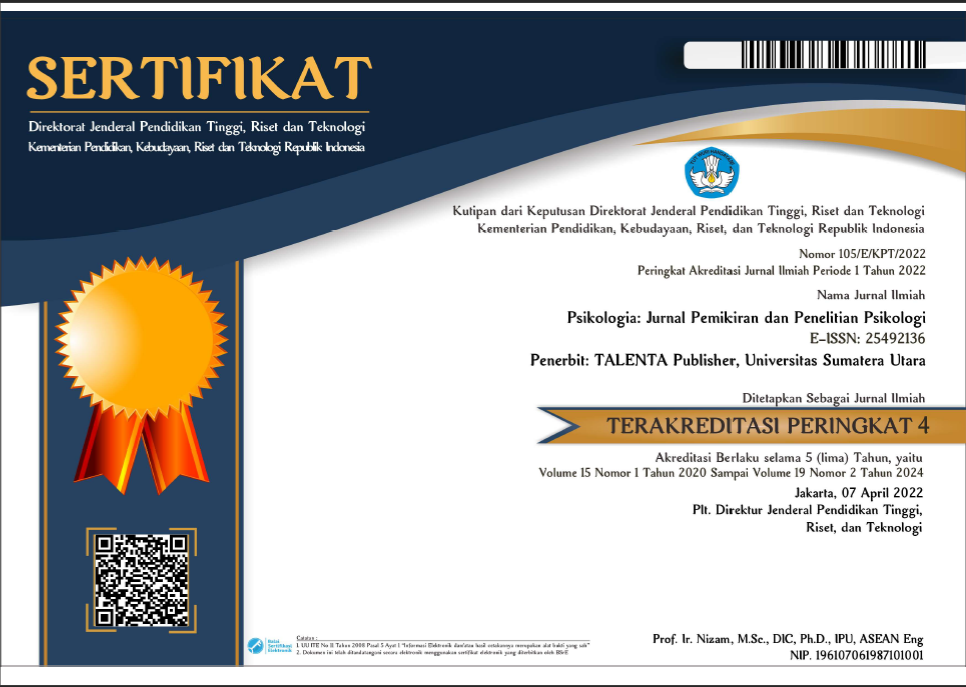Self-regulated learning of primary school teachers, reviewed from external factors
Self regulated learning guru sekolah dasar, ditinjau dari faktor eksternal
DOI:
https://doi.org/10.32734/psikologia.v18i1.10487Keywords:
self-regulated learning, external factors, teachersAbstract
This study aims to examine the overview and differences in self-regulated learning among elementary school teachers in terms of external factors such as teacher income, job position, and school status. The participants were 72 primary and junior high school teachers from North Sumatra recruited using an incidental sampling method. The measuring instrument employed is a self-regulating learning scale set up by the characteristics indicated by Pintrich, Smith, Garcia, and McKeachie (1991). The results show that self-regulated learning instructors are in the top group, and there is no difference in self-regulated learning teachers in terms of salary, work position, or school status.
Downloads
References
Azeem, N., & Khaizer Omar, M. (2018). Exploring teacher performance: A review of concepts and approaches. Faculty of Educational Studies, Universiti Putra Malaysia https://www.researchgate.net/publication/329880401
Baier, F., Decker, A. T., Voss, T., Kleickmann, T., Klusmann, U., & Kunter, M. (2019). What makes a good teacher? The relative importance of mathematics teachers’ cognitive ability, personality, knowledge, beliefs, and motivation for instructional quality. British Journal of Educational Psychology, 89(4), 767–786. https://doi.org/10.1111/bjep.12256
Ellis, R. (2000). Task-based research and language pedagogy. Language Teaching Research, 4(3), 193–220. https://doi.org/10.1177/136216880000400302
Ewijk, C. D., Fabriz, S., & Büttner, G. (2015). Fostering self-regulated learning among students by means of an electronic learning diary: a training experiment. Journal of Cognitive Education and Psychology, 14(1), 77–97. https://doi.org/10.1891/1945-8959.14.1.77
Fauth, B., Decristan, J., Rieser, S., Klieme, E., & Büttner, G. (2014). Student ratings of teaching quality in primary school: Dimensions and prediction of student outcomes. Learning and Instruction, 29, 1–9. https://doi.org/10.1016/j.learninstruc.2013.07.001
Glogger-Frey, I., Ampatziadis, Y., Ohst, A., & Renkl, A. (2018). Future teachers’ knowledge about learning strategies: Misconcepts and knowledge-in-pieces. Thinking Skills and Creativity, 28, 41–55. https://doi.org/10.1016/j.tsc.2018.02.001
Indriani, F. (2015). Kompetensi pedagogik guru dalam mengelola pembelajaran IPA di SD dan MI. Jurnal FENOMENA, 7(1).
Jagtap, P. (2016). Teachers role as facilitator in learning. Scholarly Research Journals, 3(17), 3903-3905
Karlen, Y., Hertel, S., & Hirt, C. N. (2020). Teachers’ professional competences in self-regulated learning: an approach to integrate teachers’ competences as self-regulated learners and as agents of self-regulated learning in a holistic manner. Frontiers in Education, 5. https://doi.org/10.3389/feduc.2020.00159
Kramarski, B., & Kohen, Z. (2017). Promoting preservice teachers’ dual self-regulation roles as learners and as teachers: effects of generic vs. specific prompts. Metacognition and Learning, 12(2), 157–191. https://doi.org/10.1007/s11409-016-9164-8
Kristiyani, T. (2016). Self-regulated learning konsep, implikasi dan tantangannya bagis siswa di indonesia (1st ed., Vol. 1). Sanata Dharma University Press.
Kunter, M., Klusmann, U., Baumert, J., Richter, D., Voss, T., & Hachfeld, A. (2013). Professional competence of teachers: Effects on instructional quality and student development. Journal of Educational Psychology, 105(3), 805–820. https://doi.org/10.1037/a0032583
Larkin, Shirley. (2010). Metacognition in young children. Routledge.
Magsino, L. D. (2021). Self-regulation learning variables and learners’ performance: a correlational analysis. International Review of Social Sciences Research, 1(2), 34–57. https://iiari.org/journals/irssr
Paris, S. G., & Winograd, P. (2003). The role of self-regulated learning in contextual teaching: principles and practices for teacher preparation. Institute of Education Sciences.
Peeters, J., de Backer, F., Reina, V. R., Kindekens, A., Buffel, T., & Lombaerts, K. (2014). The role of teachers’ self-regulatory capacities in the implementation of self-regulated learning practices. Procedia - Social and Behavioral Sciences, 116, 1963–1970. https://doi.org/10.1016/j.sbspro.2014.01.504
Pintrich, P. R., Smith, D. A. F., Garcia, T., & McKeachie, W. J. (1991). A manual for the use of the Motivated Strategies for Learning Questionnaire (MSLQ). National Center for Research to Improve Postsecondary Teaching and Learning.
Prince, M. (2004). Does active learning work? A review of the research. In Journal of Engineering Education, 93(3), 223–231. https://doi.org/10.1002/j.2168-9830.2004.tb00809.x
Shulman, L. S. (1987). Knowledge and teaching: foundations of the new reform. Harvard Educational Review.
Spruce, R. S. (2012). Teacher beliefs, knowledge, and practice of metacognition and self-regulated learning [Old Dominion University]. https://doi.org/DOI: 10.25777/fp7d-qr52
Turuk, M. C. (2008). The relevance and implications of Vygotsky’s sociocultural theory in the second language classroom. Annual Review of Education, Communication, and Languange Science, 5(1), 244-262
Wicaksono, A. (2021, September 17). Ahli world bank nilai kualitas guru di Indonesia masih rendah . CNN Indonesia, 1–1. https://www.cnnindonesia.com/nasional/20210917142431-12-695785/ahli-world-bank-nilai-kualitas-guru-di-indonesia-masih-rendah
Zimmerman, B. J. (1989). A social cognitive view of self-regulated academic learning. Journal of Educational Psychology, 81(3), 329–339. https://doi.org/10.1037/0022-0663.81.3.329
Downloads
Published
How to Cite
Issue
Section
License
Copyright (c) 2023 Psikologia: Jurnal Pemikiran dan Penelitian Psikologi

This work is licensed under a Creative Commons Attribution-ShareAlike 4.0 International License.








